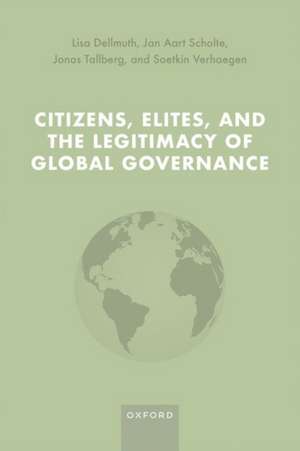Citizens, Elites, and the Legitimacy of Global Governance
Autor Lisa Dellmuth, Jan Aart Scholte, Jonas Tallberg, Soetkin Verhaegenen Limba Engleză Hardback – 28 iul 2022
Preț: 535.35 lei
Preț vechi: 613.42 lei
-13% Nou
Puncte Express: 803
Preț estimativ în valută:
102.44€ • 107.17$ • 85.10£
102.44€ • 107.17$ • 85.10£
Carte disponibilă
Livrare economică 01-07 martie
Preluare comenzi: 021 569.72.76
Specificații
ISBN-13: 9780192856241
ISBN-10: 0192856243
Pagini: 282
Dimensiuni: 162 x 240 x 20 mm
Greutate: 0.59 kg
Editura: OUP OXFORD
Colecția OUP Oxford
Locul publicării:Oxford, United Kingdom
ISBN-10: 0192856243
Pagini: 282
Dimensiuni: 162 x 240 x 20 mm
Greutate: 0.59 kg
Editura: OUP OXFORD
Colecția OUP Oxford
Locul publicării:Oxford, United Kingdom
Recenzii
The novelty of the book is that it moves away from advocacy to provide fresh quantitative evidence. To do that, the authors use two coordinated surveys. The first gathered responses from a sample of respondents in five countries: Brazil, Germany, the Philippines, Russia and the United States. The second survey, carried out by the bookâs authors themselves, focused on elites, which are defined as 'people who hold leading positions in key organizations in society that strive to be politically influential.'
Citizens, Elites, and the Legitimacy of Global Governance sets a new landmark in the fertile research area that focuses on the shape and sources of legitimacy beliefs in global governance in general, and IOs more specifically. It is a testament of its timeliness and relevance that this book's remarkable results as well as limitations will remain a most fruitful inspiration for future efforts in this area for years if not longer.
Citizens, Elites, and the Legitimacy of Global Governance sets a new landmark in the fertile research area that focuses on the shape and sources of legitimacy beliefs in global governance in general, and IOs more specifically. It is a testament of its timeliness and relevance that this book's remarkable results as well as limitations will remain a most fruitful inspiration for future efforts in this area for years if not longer.
Notă biografică
Lisa Dellmuth is Associate Professor of International Relations at Stockholm University. She obtained her PhD from the University of Mannheim in 2011. Her research focuses on aid, legitimacy, and environmental politics in global governance. Her research is published in journals such as the American Political Science Review, British Journal of Political Science, European Union Politics, Review of International Organizations, and Proceedings of the National Academy of Sciences of the U.S.A. Dellmuth is the author of Is Europe Good for You? EU Spending and Well-Being (Policy Press, 2021), which examines the effects of EU spending on citizen well-being, with implications for legitimacy perceptions of the EU.Jan Aart Scholte is Professor of Global Transformations and Governance Challenges at Leiden University and Co-Director of the Centre for Global Cooperation Research at the University of Duisburg-Essen. He held previous positions at the University of Gothenburg, University of Warwick, London School of Economics (Centennial Professor), Institute of Social Studies, and University of Sussex. His research interests include globalization, global governance, civil society in global politics, global democracy, and Internet governance. Jan has published extensively, taken research to many practitioner circles, and is a former lead editor of the journal Global Governance.Jonas Tallberg is Professor of Political Science at Stockholm University. His primary research interests are global governance and European Union politics. He is the principal investigator of the research program "Legitimacy in Global Governance" (LegGov). Tallberg's books include Legitimacy in Global Governance: Sources, Processes, and Consequences (OUP, 2018, co-edited), The Opening Up of International Organizations: Transnational Access in Global Governance (CUP, 2013, co-authored), and Leadership and Negotiation in the European Union (CUP, 2006). His articles have appeared in journals such as American Political Science Review, International Organization, International Studies Quarterly, British Journal of Political Science, Review of International Organizations, and European Journal of International Relations. Soetkin Verhaegen is Assistant Professor in European Politics at the Faculty of Arts and Social Sciences, Department of Political Science, at Maastricht University. Her main research subjects are citizens' perceptions of (il)legitimacy of governing institutions in the context of multilevel governance, European identity, youth, and political socialization. Soetkin is principal investigator in the GLOBPOL project on citizens' attitudes towards globalization and multilevel governance. She is specialized in survey research and focus groups. Her work has been published in journals such as American Political Science Review, Journal of Common Market Studies, European Journal of International Relations, European Political Science Review, and Comparative European Politics.
